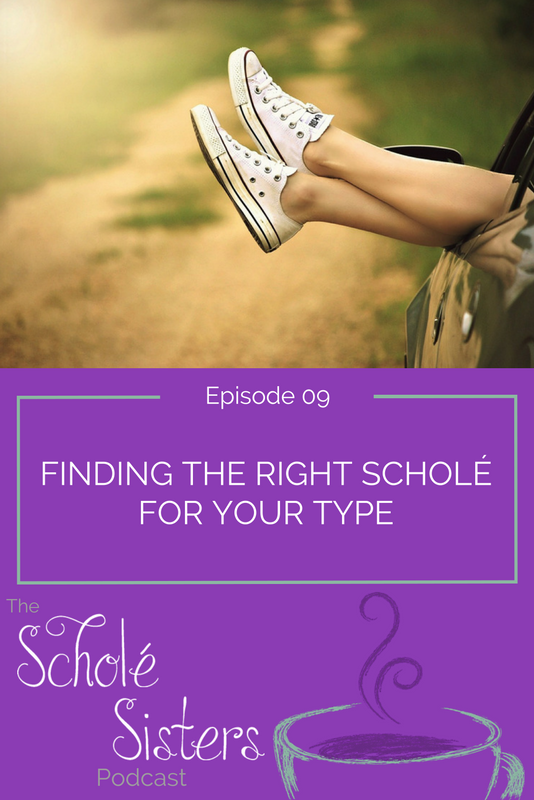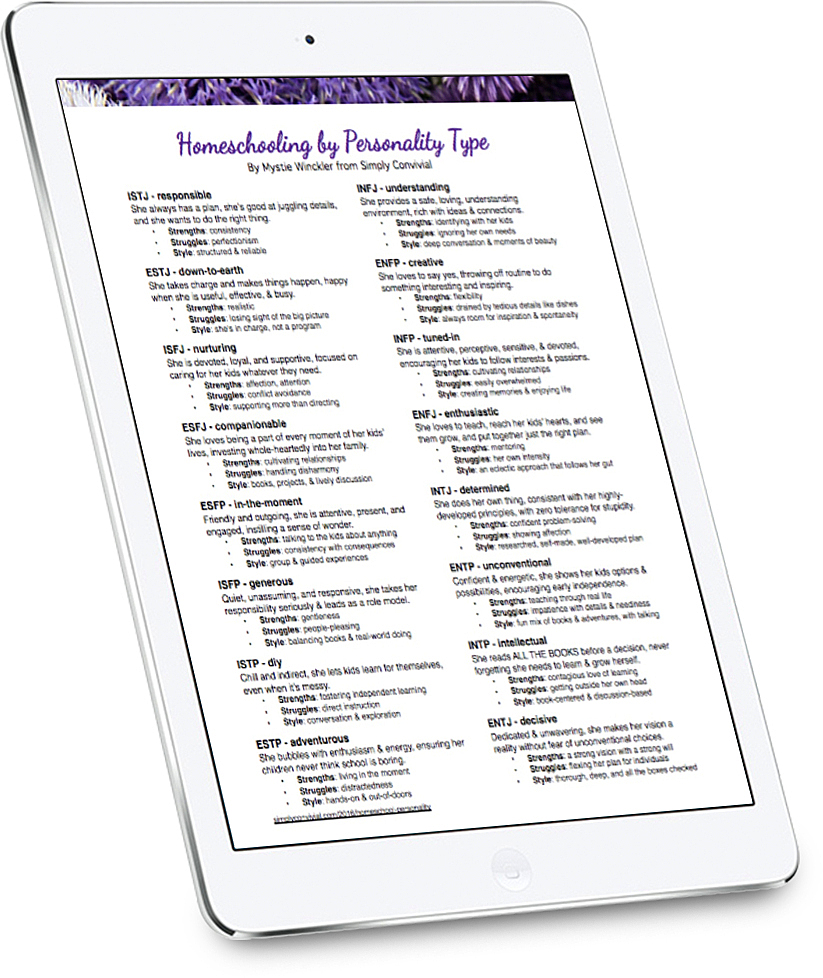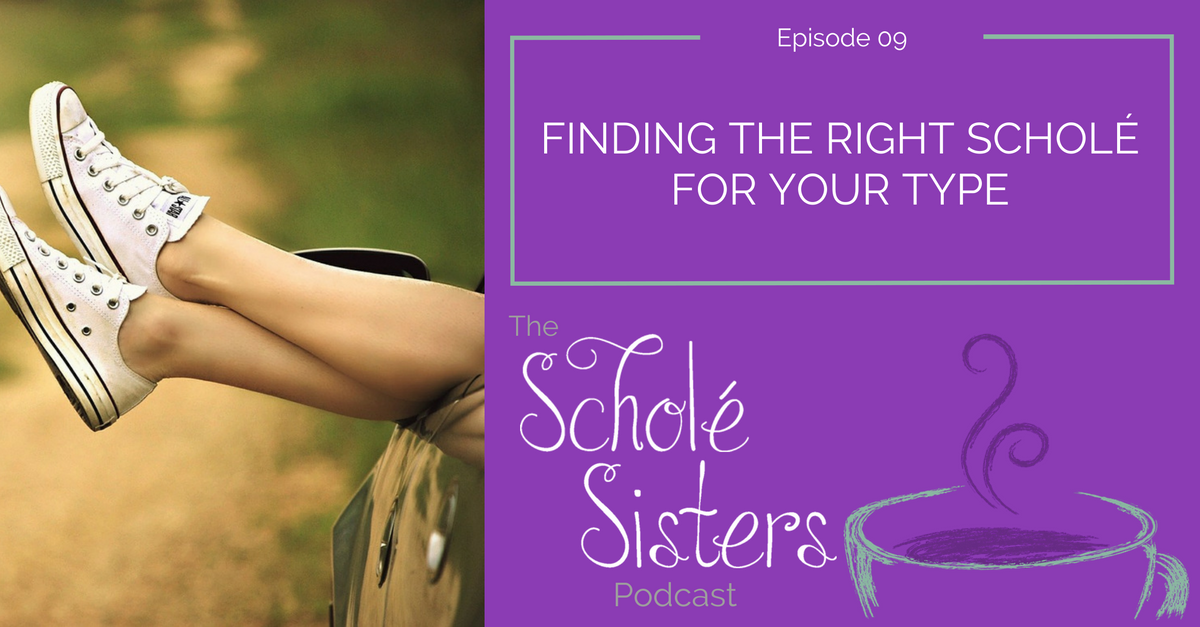SS #09: Finding the Right Scholé for Your Type
In today’s episode, Mystie and I explore the relationship between personality types and scholé. Mystie draws a distinction I had never thought about before — that some types of scholé are restorative, while others bring about more of a stretching and growing — and different types serve these purposes for different personality types. The bottom line is that if you are in need of some restoration, knowing your personality type and what restores it can be super helpful.

Thank you to our sponsor:
This episode is sponsored by the Simplified Organization Brain Dump Guide. How much crazy do you have rolling around in your head? Before you declutter your closets, you should declutter your head! Mystie’s free brain dump guide will help you do just that. By writing down all the obligations, responsibilities, reminders, random facts, and expectations that keep your mind churning, you’ll free up your mental energy so you can use it where you need it. The free Brain Dump Guide at Simplified Organization will walk you through the process with prompts and tips so you can declutter your head and move ahead with clarity and peace.
Listen to the podcast:
Podcast: Play in new window | Download
How does your personality affect your homeschool? Get Mystie’s summary sheet!

Show Notes:
- Scholé RDA
- Mystie:
You Are What You Love by James K.A. Smith
- Brandy:
Earlier Writings by Augustine
On the Incarnation by Athanasius (also mentioned)
- Mystie:
- Topical Discussion: Finding the Right Scholé for Your Type
- Overview of the 16 types
- What’s your homeschool personality? by Mystie
- Personality test options:
- The Mental Neat Freak by Jennifer Fulwiler
The Great Tradition by Richard Gamble
- Mystie’s sister: Melanie Thompson
- How to Start Your Own Scholé Sisters Group
Gifts Differing by Isabel Briggs Meyers
- Voxer
Leisure the Basis of Culture by Josef Pieper
- Nitty Gritty Homeschool Question
- A talk about first day of school traditions!
Please leave us a review in iTunes!
If you don’t know how to do that, click here for illustrated instructions.
Want to ask an upcoming Nitty Gritty Homeschool Question?
Go fill out this handy little form and your question might be featured on a future episode of the show!









I guess I’m really confused as to how scholé is considered restorative. By definition, it can’t be. If it was restorative, it would be no more than preparing us for work which as it is clearly defined is not doing. I guess I’m confused by what definition you are using.
If you’ve read Pieper, Hicks, or Plato, scholé is not about restoration, even in the classical sense of the word. Not one source document has used scholé as restoration. Resting is not describing restorative. Resting is a lack of anxiety due to knowing you are actually partipating inside of your cosmic obligation. You are not anxious because you are aware of what you are doing and why you are doing it.
I am also confused as to why such an oversight is being made. Several of your episodes have evolved around an incomplete or misunderstanding of this word. I’ve heard several times that you have read these books or discussed this concept, but the credibility is lacking in actual subject knowledge. It’s disappointing to say the least.
It is so great to have new episodes of the podcast! Mystie, I think your analysis was spot on, at least for this ISFJ. 😉 I was nodding vigorously when you described an SJ needing to create, to make something with her hands. One of my favorite ways to feel energized is to sit and knit or crochet while listening to a good podcast or audio book…in my favorite coffee shop even better! Today is our last day of summer vacation and I have been so depressed because I didn’t do really anything relaxing or fun for me during our weeks off. I planned for the new school year, kept up the housework (somewhat), cooked lots of meals and carted children around town. By the end of the days I was too tired to do anything more than amuse myself by watching the Olympics…and occasionally read a book. To maintain my sanity, I need to be more intentional with my leisure and put it at a time of day when I am not exhausted. Thanks for sharing your insights! I always come away with something new to think about.
I didn’t have a hard time following the distinction. Mystie stated that she was presenting these ideas after doing her own research and coming to her own conclusions.
It’s my understanding that schole is most simply defined as leisure, which is defined as free time. One can use this for personal development through study or through things that energize and restore us – painting, exercise, walking, time in nature. There was a distinction made between this and simply vegetating in front of the television.
Also, rest and restoration seem to have the same root word.
Thank you for the ideas for personal development and schole that did not include reading! I appreciate the time you’ve put in and the gracious way you are serving other homeschool mothers out there.
I enjoyed the point Brandy brought up – that we may feel like introverts now only because we are surrounded by needy people all day! That was interesting to me.
There would be a problem if you were engaging in the leisure activity merely so you could go back to your work with a clearer head. We probably should have made that distinction also – scholé is good unto itself and isn’t done *so that* you can work better. We work to be at leisure, not the opposite. However, too many moms work and then only amuse themselves and don’t ever take real leisure, they don’t treat themselves like a full, whole person. The point of scholé is not getting rested up to get back to work, but burnout does happen when we don’t take scholé – so scholé does prevent burnout. The restorative/stretching distinction I think falls along the same lines as the ratio/intellectus distinction Peiper makes in the first chapter – both are good, but one is effortful and deliberate and energy-demanding and the other puts us in that receptive mode that we need to access to stay sane – hence, it’s restorative – it restores to us our full-orbed humanity.
I swear you all can read my mind better than I know myself. I had a hard time getting into this episode because I went into it thinking this was not relevant to me. Of course, I still came to listen to it because I think this about most of them and I’m always surprised on how much I needed to hear what you said. That was the case again! It’s almost scary how you do this!! ; ) I’m completely mental exhausted and fatigued so much that I feel like it won’t get better and I’m struggling to function. I understand better now why and why what I was doing to fix it wasn’t working and what I need to do about it. I’m struggling a little on specific actions at the moment, but those will come hopefully soon. Thanks!!
Oh, Cassie! That warms my heart! I’m so glad. I will pray for you while you try to turn it around — I know how hard it can be when you get to that point! ♥
Make sure you’re following Brandy’s low energy (fatigued!) mom series – http://afterthoughtsblog.net/2016/04/low-energy-moms-guide-homeschooling.html – It’s super helpful!
I enjoyed the concept of the show but thought the examples missed the mark. By putting two letters together and saying “SJs are this” glosses over the purpose of the cognitive functions and achieves only about 50% accuracy. . For instance, I’m an ESTJ, so I share the SJ with Jennifer above (ISFJ), but in her personality type, her dominant cognitive function is Introverted Sensing (Si) and her Auxillary is Extroverted Feeling (Fe). My dominant is Extraverted Thinking (Te) and Auxillary is Introverted Sensing (Si). Furthermore, our Auxillary Cognitive Function is more likely to play that “support” role, which seems to line up with your purposes for discussion of Schole’. So, Jennifer would support herself with Extraverted Feeling, while I would use Introverted Sensing…totally different!! Similarly, you two ladies, as INTJs, have an Auxillary of Extraverted Thinking (same as my dominant). I can tell you as an ESTJ, I need copious time to read and mentally process, but I also like to discuss my ideas with friends…which sounds more similar to you. But I do NOT like playing sports, doing (or creating) adult coloring books, or anything else you attributed to SJs (I believe your reference was the SFJs who have Fe in their dominant or Auxillary).
Admittedly, this sounds like a foreign language to me because, as I said in the show, I haven’t read the books. I just interrogate Mystie. 😉 But I thought I’d clarify that I am NOT an INTJ. (Just in case anyone else was thinking I was.) I’m an INTP, with a very strong P. 🙂
Aha. It seemed y’all were claiming lots of similarities. You have Ti (Introverted Thinking) as your dominant cog function and Ne (Extraverted Intuition) as Auxillary. Still way different from an Extraverted Feeling type 🙂
We have our similarities, but there is a reason why I make her pretend to be my life coach. 😉
Ladies,
What a refreshing afternoon I spent listening to this podcast! I have been fascinated by the MBTI since I was a college freshman and took the test. The results were reassuring and clarifying. (In the minority as an INFP, it was nice to find that there were others like me out there!) As I was listening to your podcast I was finally able to piece together the reason that my ISTJ (corporate accountant husband) prefers to spend his leisure time engaged in mechanical work or screen time (action movies or learning how to perform that mechanical work), whereas I would prefer the quiet solitude of a book, a movie with a stirring storyline, or creative endeavors (cooking, graphic design, photography). I was also able to mentally assess my four children and think about how I can best serve their various needs for external sensory exposure. (One of mine would be thrilled to school every day at a coffee shop or park, but that would drain me dry!) I was convicted that I need to serve my family members more actively by helping them to enjoy their own unique variety of scholé.
Ladies, I must say that exploring your individual podcasts and websites has been a supreme source of scholé for me in these past 6 weeks! I may not have time to read as much as I would like right now, but hearing your ideas and reading a little at a time from your blogs have rejuvenated my passion for homeschooling — propelling me into this new school year with an exuberance to seek truth, beauty, and goodness!
Kindest regards, Bethany
I’m so glad you’re back! And I think this is the perfect kick-off episode topic for a new season. I started nodding emphatically and smiling to myself when Mystie started talking about I-S personalities and handcrafts. I look forward to crocheting every evening after the kids are in bed, though admittedly, I am usually also sitting with my husband to watch a show while I do it. The show doesn’t really restore me, but those stitches!
Ladies,
I love listening to you! Thank you for the work that you do… AND how you’re sharing it with us so that we can all grow together.
I have a possible explanation for Brandy, your tendency toward becoming more extremely, whatever, rather than toward more balance or maturity:
Our personalities are not growing in isolation. We are placed in a family, in relationships that form us as we go. What our husband is (or is not), the personalities of our various children, and the mothering role itself, all leave their marks on us. This is actually a good thing, and may change with the seasons. My personality isn’t naturally nurturing, but the mothering role is (at least for younger children), so I become more balanced, as I work toward doing the job well. But if someone was already tending toward nurturing, she might become even more so in the role. If I had taken a different path, doing the corporate ladder thing, I would have grown more in (one of) my “natural” direction, and become even more ENTJish. 😉 Also, I think age plays a role. I found my 30s much more free to be myself and more sure of my own gut decisions than my previous decades. So your results may not indicate a lack of maturity.
I hope you are right because it certainly makes me feel better! 😉